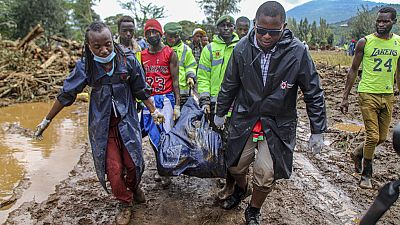Climate
In Brazil, floods have killed dozens of people and destabilised a city of around 4 million people. In India, at the time of national elections, voters and politicians fainted in heat that reached 46.3 degrees Celsius.
In Asia, a brutal heat wave closed schools in the Philippines, killed people in Thailand, and set records there, as well as in Indonesia, Malaysia, the Maldives, and Myanmar. Record temperatures – especially at night, when there is no cooling – have hit many parts of Africa. Flooding has devastated Houston, and the United States as a whole just experienced its second-highest number of tornadoes for the month of April.
In a world increasingly accustomed to extreme weather variations, recent days and weeks have seemingly taken these environmental extremes to the next level. Some climate scientists say it's difficult for them to remember that so much of the planet experienced such extreme weather at the same time.
“Given that we have seen unprecedented global warming over the past 11 months, it is not surprising to see worsening climate extremes so early in the year,” says Jonathan Overpeck, dean of the Faculty of Medicine. environment at the University of Michigan. “If this record warming continues, 2024 will likely be a record year for climate disasters and human suffering.”
Heat records
As the planet warms, it is likely to experience more extreme climate and weather events, including record heat and precipitation, scientists say. Climate change is also altering weather patterns, causing rainy and warm systems to be blocked over certain regions and the meandering of the jet stream to change, says Alvaro Silva, a climate specialist at the World Meteorological Organization (WMO).
The weakening of El Nino (natural warming of parts of the central Pacific which modifies weather conditions throughout the world), which followed three years of La Nina (its cold counterpart), adds to the more marked effects of climate change caused by humans, explains Mr. Silva.
Scientists also pointed to 13 consecutive months of record ocean heat as a potential factor in the extreme weather. All this comes as the world has just completed its eleventh consecutive month of record heat, European climate service Copernicus reported on Wednesday.
April's global average temperature of 15 degrees Celsius broke the old 2016 record by 0.14 degrees Celsius. Copernicus data dates back to 1950, while other climate monitoring agencies date back to 1850, but have not yet reported their calculations for April.
Warming
Last month was 1.58 degrees Celsius warmer than the pre-industrial period of the late 19th century. In 2015, the world adopted a goal to limit warming to 1.5 degrees Celsius above pre-industrial times, but that goal primarily applies to staying this hot for a decade or more, not for a month.
If several factors play a role in this recent wave of extremes, “climate change is the most important,” argues Mr. Silva.
The problem is that the world has adapted and built cities designed for the temperatures and precipitation of the 20th century, but climate change is bringing more heat and torrential rains, said Andrew Dessler, a climatologist at A&M University. from Texas.
“We are leaving the climate of the 20th century and we simply cannot cope with these events,” Mr. Dessler said. “They are becoming slightly more extreme, but they are beyond our ability to handle them.”
Extreme phenomena
Katharine Hayhoe, a climate scientist at Texas Tech and chief scientist at the Nature Conservancy, said the extreme events were overlapping in more places.
“Climate change is stacking the weather dice against us in every part of the world,” Ms Hayhoe said. “This means it increases not only the frequency and severity of many extreme weather events but also the risk of compound events.”
During the first five days of May, 70 countries or territories broke heat records, says climatologist Maximiliano Herrera, who tracks temperature readings around the world.
Nandyala and Kadapa, in the southern Indian state of Andhra Pradesh, set a historic record with a temperature of 46.3 Celsius. Nitin Gadkari, a federal minister, fainted during an election campaign in the western Indian state of Maharashtra.
“Heatwaves in India are by far the deadliest type of extreme weather event. At the same time, they are the type of extreme events that are increasing the most in a warming world,” says climate scientist Friederike Otto in a press release earlier this week.
Scorching heat
This week, in Southeast Asia, "the May night was the hottest on record," Mr. Herrera said on X (formerly Twitter). In some areas of Thailand, the temperature did not drop below 30.9 degrees Celsius.
In late April, parts of northern Thailand reached 44 Celsius, while the town of Chauk, in Myanmar's hottest region, recorded a record 48.2 Celsius.
Many African nations are also facing scorching heat. According to Mr. Herrera, the temperature reached 47.5 Celsius in Kayes, Mali. The capital of Niger experienced the hottest night of May and that of Burkina Faso, the hottest night of all months. In Chad, in northern central Africa, temperatures are expected to remain above 45.6 degrees all week.
The deadly heatwave that hit West Africa last month is linked to man-made climate change, according to scientists at World Weather Attribution.
In Ciudad Altamirano, Mexico, the temperature touched 46 degrees and heat records were recorded across Latin America, Herrera said. Bolivia experienced its hottest May night on record and Brazil its hottest May day.
Floods
According to Francisco Aquino, a climatologist at the Federal University of Rio Grande do Sul, Brazil's record heat that has sweltered major cities like Sao Paulo has also prevented a rainstorm from moving into the south of the country, making it deadly.
There was also a massive influx of moisture from the Amazon's "flying rivers," or air currents that carry water vapor, Aquino said. “The clouds thus generated extreme precipitation,” he added.
The southern state of Rio Grande do Sul is suffering the worst floods on record, with at least 90 dead, nearly 204,000 people displaced and 388 municipalities affected, according to local authorities.
In Porto Alegre, a city of more than 4.4 million inhabitants, waters invaded the city center, the international airport, and several neighborhoods. Authorities said it would take several days for the water level to drop.
Houston is still trying to dry out after days of heavy rain that required the rescue of more than 600 people across Texas, including 233 in Houston. Northeast of Houston, about 58 centimeters fell.
At the same time, April saw the heaviest rains on record in the United Arab Emirates, which flooded portions of major highways in the desert kingdom, and Dubai International Airport, the hub busiest in the world for international travel.














01:42
Fourth mass coral bleaching prompts UN alarm
02:34
Health threats of climate change reach record-breaking levels, report says
01:50
The battle to save seagrass off Kenya's coast
01:43
Scientists says climate change has worsened deadly flooding in Africa
01:33
Delegates meet in Colombia to address global biodiversity crisis
01:44
Climate change and conflict increase malnutrition rates in Nigeria